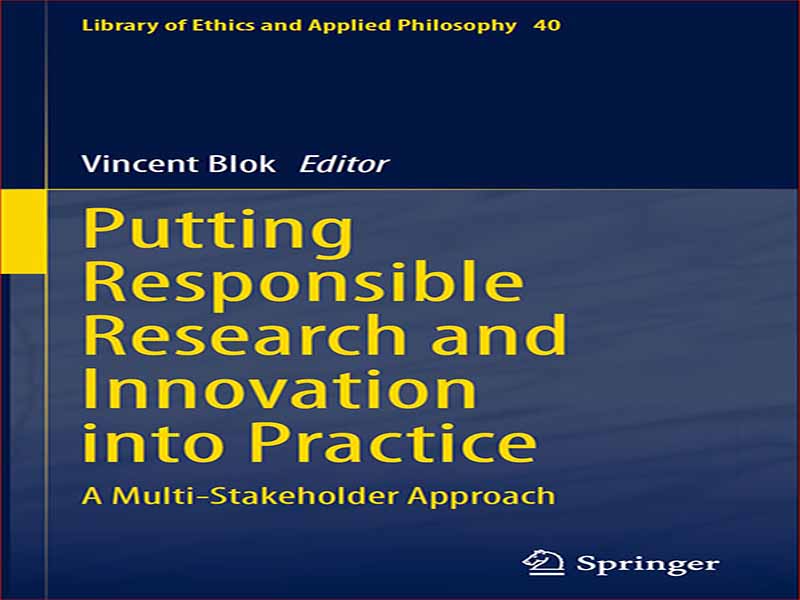- عنوان کتاب: Putting Responsible Research and Innovation into Practice
- نویسنده: Maia Chankseliani
- حوزه: تحقیقات
- سال انتشار: 2022
- تعداد صفحه: 282
- زبان اصلی: انگلیسی
- نوع فایل: pdf
- حجم فایل: 6.82 مگابایت
پس از دوره ای که در آن تحقیق و نوآوری مسئول (RRI) به عنوان یک موضوع فرابخشی تحت برنامه چارچوب هشتم اتحادیه اروپا برای تحقیق و نوآوری (R&I)، افق 2020 قرار داشت، توسعه و اجرای بیشتر آن به یک دوراهی رسیده است. . مشخص شد که ادغام یکپارچه RRI در اقدامات تحقیق و توسعه اروپا وجود ندارد (Novitzky et al. 2020) و بودجه اختصاصی برای RRI تقریباً به طور کامل در نهمین برنامه چارچوب اتحادیه اروپا برای تحقیق و من، Horizon Europe وجود ندارد. . در عین حال، چالشهای جهانی مانند تغییرات آب و هوایی به طور فزایندهای فوریتر میشوند و بنابراین همچنان به تلاشهای جمعی تحقیقات علمی و صنعت، سیاستگذاران و جامعه مدنی نیاز دارند. علاوه بر این، ظهور فناوری های مخرب مانند زیست شناسی مصنوعی، هوش مصنوعی و روباتیک چندین نگرانی اجتماعی جدید را ایجاد می کند. در نهایت، ناباوری فزاینده به علم، همانطور که در طول همهگیری کرونا نشان داده شد، اهمیت همسویی خطمشی تحقیق و توسعه و ارزشهای اجتماعی را بیش از پیش نشان میدهد. به دلایلی مانند این، عدم سرمایه گذاری در خط برنامه اختصاصی Science With و For Society برای RRI در Horizon Europe منجر به کاهش توجه آکادمیک برای تعبیه علم در جامعه نشد. در مقابل، یک جامعه تحقیقاتی اختصاصی پدید آمد که در گفتمان آکادمیک RRI شرکت میکند و سعی میکند در پروژههایی با موضوعاتی مانند حکمرانی دادههای مسئولانه، هوش مصنوعی مسئولانه و آگرواکولوژی مسئولانه در چارچوب برنامه چارچوب افق اروپا مشارکت کند، حتی گاهی اوقات با استفاده از قاب RRI. اگر RRI میخواهد آیندهای در دستور کار علمی باز کمیسیون اروپا و برنامه افق اروپا داشته باشد، تمرکز بر روی اجرا، نهادینهسازی و مدیریت مسئولیت در فعالیتهای تحقیق و پژوهش اهمیت دارد. یکی از نقاط ضعف گفتمان دانشگاهی فعلی RRI تمرکز آن بر تحلیل مفهومی و نظری است. نظریهها و رویکردهای مختلفی تحت عنوان RRI پدیدار شدند، از طراحی حساس به ارزش تا شش کلید RRI، که همگی ایدهآلها و موانع خاص خود را برای رسیدن به آن آرمانها داشتند (Timmermans and Blok 2018). این امر اجرای و مدیریت RRI را به یک چالش بزرگ تبدیل میکند و اختلافی بین جاهطلبیهای ترویج شده RRI و تحقق آنها در عمل ایجاد میکند (Novitzky et al. 2020). این مورد در سطح وسیعتر سیاستگذاری نیز صادق است، جایی که RRI با تنشهای ساختاری با اهداف سیاستی دیگر، مانند برتری علمی و ارزش اقتصادی مواجه است (رودریگز 2019). ضعف دیگر این است که تا به امروز، گفتمان آکادمیک RRI به جای اینکه به عنوان مثال روی مهندسان و دانشمندانی که در واقع در حوزه فناوریهای مخرب کار میکنند، تمرکز اصلی خود را بر خود جامعه تحقیقاتی RRI داشته باشد. آخرین ضعف این است که جامعه تحقیقاتی RRI عمدتاً بر روی شیوههای تحقیقاتی عمومی تمرکز میکند، در حالی که مقدار قابل توجهی از شیوههای نوآوری در بخش خصوصی که با چالشها و فرصتهای خاص خود مواجه است انجام میشود (Blok and Lemmens 2015). تا زمانی که زمینه بخش خصوصی R&I در نظر گرفته نشود، اجرای و مدیریت RRI برای همسویی با سه هدف سیاست R & I اروپا – علم باز، نوآوری باز، باز برای جهان – برای افزایش پاسخگویی علم به جامعه (DGRI 2016). هدف این جلد این است که بر روی کار بزرگی که قبلاً توسط جامعه تحقیقاتی RRI انجام شده است، و درگیر کردن متخصصان، دست اندرکاران و سیاست گذارانی که خارج از جامعه تحقیقاتی RRI کار می کنند، برای پیاده سازی، نهادینه کردن و مدیریت مسئولیت در R & I خود استفاده کنند. تمرینات ما توانستیم این مخاطبان وسیعتر، از جمله افرادی که در علم و صنعت کار میکنند، درگیر کنیم، زیرا نویسندگان این جلد در یک پروژه بزرگ هماهنگی و حمایت اروپایی مشارکت داشتند که هدف آن مشارکت جامعه تحقیق و پژوهش اروپایی در ترویج و توسعه بود. پذیرش RRI در تمام خطوط برنامه Horizon 2020. تعالی در علم و نوآوری برای اروپا با اتخاذ مفهوم تحقیق و نوآوری مسئول (NewHoRRIzon). پس از تشخیص جذب RRI در خط برنامه های مختلف Horizon 2020 (Novitzky et al. 2020)، این پروژه مبنای مفهومی و عملیاتی را برای ادغام کامل RRI در عملکرد اروپایی و ملی (R&I) و منابع مالی. به منظور دستیابی به این هدف، این پروژه 18 آزمایشگاه اجتماعی را به عنوان روشی فراگیر برای پیاده سازی و مطالعه RRI در تمام خطوط برنامه H2020 ایجاد کرد (Timmermans et al. 2020).
After a period in which Responsible Research and Innovation (RRI) stood as a cross-cutting issue under the Eigth European Union Framework Programme for Research and Innovation (R & I), Horizon 2020, its further development and implementation has reached a crossroad. It turned out that there is a lack of consistent integration of RRI in Europe’s R & I practices (Novitzky et al. 2020), and dedicated funding for RRI is almost entirely absent in the Ninth European Union Framework Programme for R & I, Horizon Europe. At the same time, global challenges like climate change become increasingly more urgent and thus continue to call for collective efforts of scientific research and industry, policy makers and civil society. Further, the emergence of disruptive technologies like synthetic biology, artificial intelligence and robotics raises several new societal concerns. Finally, the growing disbelief in science, as shown during the Corona pandemic, demonstrates the importance of aligning R & I policy and societal values all the more. For reasons as these, the disinvestment in a dedicated Science With and For Society programme line for RRI in Horizon Europe did not result in decreased academic attention for embedding science in society. On the contrary, a dedicated research community emerged that engages in the academic discourse of RRI and tries to contribute to projects on topics such as responsible data governance, responsible AI, and responsible agroecology within the Horizon Europe framework programme, sometimes even without the use of the frame RRI.
If RRI is to have a future in the European Commission’s Open Science Agenda and Horizon Europe Programme, it is important to focus on the implementation, institutionalization and management of responsibility in R & I practices. One of the weaknesses of the current academic discourse of RRI is its focus on conceptual and theoretical analysis. A variety of theories and approaches emerged under the heading of RRI, ranging from Value Sensitive Design to the six keys of RRI, all having their own ideals and barriers to reaching those ideals (Timmermans and Blok 2018). This makes the implementation and management of RRI an enormous challenge, leaving a discrepancy between the promoted ambitions of RRI and their realization in practice (Novitzky et al. 2020). This is also the case at the broader policy level, where RRI faces structural tensions with other policy goals, such as scientific excellence and economic value (Rodríguez 2019). Another weakness is that to this day the academic discourse of RRI is primary focused on the RRI research community itself, rather than on, for instance, the engineers and scientists who are actually working in the area of disruptive technologies . A final weakness is that the RRI research community mainly focusses on public research practices, while a significant amount of innovation practices take place in the private sector facing its own challenges and opportunities (Blok and Lemmens 2015). As long as the private sector context of R & I is not taken into account, the implementation and management of RRI will be difficult to align with the three goals for European R & I policy – Open science, open innovation, open to the world – to increase responsiveness of science to society (DGRI 2016). The aim of this volume is to build on the great work that is already done by the RRI research community, and to engage professionals, practitioners and policy-makers working outside the RRI research community to implement, institutionalize and manage responsibility in their R & I practices. We were able to engage this wider audience, including people working in science and industry, because the authors of this volume were involved in a large European Coordination and Support Action project that aimed to engage the European R & I community in the promotion and acceptance of RRI in all programme lines of Horizon 2020; Excellence in Science and Innovation for Europe by adopting the concept of Responsible Research and Innovation (NewHoRRIzon). After a diagnosis of the uptake of RRI in the various programme line of Horizon 2020 (Novitzky et al. 2020), the project worked out the conceptual and operational basis to fully integrate RRI into European and national (R & I) practice and funding. In order to accomplish this goal, the project established 18 Social Labs as inclusive methodology to implement and study RRI in all programme lines of H2020 (Timmermans et al. 2020).
این کتاب را میتوانید از لینک زیر بصورت رایگان دانلود کنید:
Download: Putting Responsible Research and Innovation into Practice





































نظرات کاربران